29 Aug 18 | Bahrain, Bahrain Statements, Campaigns -- Featured, Statements
[vc_row][vc_column][vc_single_image image=”95198″ img_size=”full” add_caption=”yes”][vc_column_text]For the second time since 2013, the United Nations (UN) Working Group on Arbitrary Detention (WGAD) has issued an Opinion regarding the legality of the detention of Mr. Nabeel Rajab under international human rights law.
In its second opinion, the WGAD held that the detention was not only arbitrary but also discriminatory. The 127 signatory human rights groups welcome this landmark opinion, made public on 13 August 2018, recognising the role played by human rights defenders in society and the need to protect them. We call upon the Bahraini Government to immediately release Nabeel Rajab in accordance with this latest request.
In its Opinion (A/HRC/WGAD/2018/13), the WGAD considered that the detention of Mr. Nabeel Rajabcontravenes Articles 2, 3, 7, 9, 10, 11, 18 and 19 of the Universal Declaration on Human Rights and Articles 2, 9, 10, 14, 18, 19 and 26 of the International Covenant on Civil and Political Rights, ratified by Bahrain in 2006. The WGAD requested the Government of Bahrain to “release Mr. Rajab immediately and accord him an enforceable right to compensation and other reparations, in accordance with international law.”
This constitutes a landmark opinion as it recognises that the detention of Mr. Nabeel Rajab – President of the Bahrain Center for Human Rights (BCHR), Founding Director of the Gulf Centre for Human Rights (GCHR), Deputy Secretary General of FIDH and a member of the Human Rights Watch Middle East and North Africa Advisory Committee – is arbitrary and in violation of international law, as it results from his exercise of the right to freedom of opinion and expression as well as freedom of thought and conscience, and furthermore constitutes “discrimination based on political or other opinion, as well as on his status as a human rights defender.” Mr. Nabeel Rajab’s detention has therefore been found arbitrary under both categories II and V as defined by the WGAD.
Mr. Nabeel Rajab was arrested on 13 June 2016 and has been detained since then by the Bahraini authorities on several freedom of expression-related charges that inherently violate his basic human rights. On 15 January 2018, the Court of Cassation upheld his two-year prison sentence, convicting him of “spreading false news and rumors about the internal situation in the Kingdom, which undermines state prestige and status” – in reference to television interviews he gave in 2015 and 2016. Most recently on 5 June 2018, the Manama Appeals Court upheld his five years’ imprisonment sentence for “disseminating false rumors in time of war”; “offending a foreign country” – in this case Saudi Arabia; and for “insulting a statutory body”, in reference to comments made on Twitter in March 2015 regarding alleged torture in Jaw prison and criticising the killing of civilians in the Yemen conflict by the Saudi Arabia-led coalition. The Twitter case will next be heard by the Court of Cassation, the final opportunity for the authorities to acquit him.
The WGAD underlined that “the penalisation of a media outlet, publishers or journalists solely for being critical of the government or the political social system espoused by the government can never be considered to be a necessary restriction of freedom of expression,” and emphasised that “no such trial of Mr. Rajab should have taken place or take place in the future.” It added that the WGAD “cannot help but notice that Mr. Rajab’s political views and convictions are clearly at the centre of the present case and that the authorities have displayed an attitude towards him that can only be characterised as discriminatory.” The WGAD added that several cases concerning Bahrain had already been brought before it in the past five years, in which WGAD “has found the Government to be in violation of its human rights obligations.” WGAD added that “under certain circumstances, widespread or systematic imprisonment or other severe deprivation of liberty in violation of the rules of international law may constitute crimes against humanity.”
Indeed, the list of those detained for exercising their right to freedom of expression and opinion in Bahrain is long and includes several prominent human rights defenders, notably Mr. Abdulhadi Al-Khawaja, Dr.Abduljalil Al-Singace and Mr. Naji Fateel – whom the WGAD previously mentioned in communications to the Bahraini authorities.
Our organisations recall that this is the second time the WGAD has issued an Opinion regarding Mr. Nabeel Rajab. In its Opinion A/HRC/WGAD/2013/12adopted in December 2013, the WGAD already classified Mr. Nabeel Rajab’s detention as arbitrary as it resulted from his exercise of his universally recognised human rights and because his right to a fair trial had not been guaranteed (arbitrary detention under categories II and III as defined by the WGAD).The fact that over four years have passed since that opinion was issued, with no remedial action and while Bahrain has continued to open new prosecutions against him and others, punishing expression of critical views, demonstrates the government’s pattern of disdain for international human rights bodies.
To conclude, our organisations urge the Bahrain authorities to follow up on the WGAD’s request to conduct a country visit to Bahrain and to respect the WGAD’s opinion, by immediately and unconditionally releasing Mr. Nabeel Rajab, and dropping all charges against him. In addition, we urge the authorities to release all other human rights defenders arbitrarily detained in Bahrain and to guarantee in all circumstances their physical and psychological health.
This statement is endorsed by the following organisations:
1- ACAT Germany – Action by Christians for the Abolition of Torture
2- ACAT Luxembourg
3- Access Now
4- Acción Ecológica (Ecuador)
5- Americans for Human Rights and Democracy in Bahrain – ADHRB
6- Amman Center for Human Rights Studies – ACHRS (Jordania)
7- Amnesty International
8- Anti-Discrimination Center « Memorial » (Russia)
9- Arabic Network for Human Rights Information – ANHRI (Egypt)
10- Arab Penal Reform Organisation (Egypt)
11- Armanshahr / OPEN Asia (Afghanistan)
12- ARTICLE 19
13- Asociación Pro Derechos Humanos – APRODEH (Peru)
14- Association for Defense of Human Rights – ADHR
15- Association for Freedom of Thought and Expression – AFTE (Egypt)
16- Association marocaine des droits humains – AMDH
17- Bahrain Center for Human Rights
18- Bahrain Forum for Human Rights
19- Bahrain Institute for Rights and Democracy – BIRD
20- Bahrain Interfaith
21- Cairo Institute for Human Rights – CIHRS
22- CARAM Asia (Malaysia)
23- Center for Civil Liberties (Ukraine)
24- Center for Constitutional Rights (USA)
25- Center for Prisoners’ Rights (Japan)
26- Centre libanais pour les droits humains – CLDH
27- Centro de Capacitación Social de Panama
28- Centro de Derechos y Desarrollo – CEDAL (Peru)
29- Centro de Estudios Legales y Sociales – CELS (Argentina)
30- Centro de Políticas Públicas y Derechos Humanos – Perú EQUIDAD
31- Centro Nicaragüense de Derechos Humanos – CENIDH (Nicaragua)
32- Centro para la Acción Legal en Derechos Humanos – CALDH (Guatemala)
33- Citizen Watch (Russia)
34- CIVICUS : World Alliance for Citizen Participation
35- Civil Society Institute – CSI (Armenia)
36- Colectivo de Abogados « José Alvear Restrepo » (Colombia)
37- Collectif des familles de disparu(e)s en Algérie – CFDA
38- Comisión de Derechos Humanos de El Salvador – CDHES
39- Comisión Ecuménica de Derechos Humanos – CEDHU (Ecuador)
40- Comisión Nacional de los Derechos Humanos (Costa Rica)
41- Comité de Acción Jurídica – CAJ (Argentina)
42- Comité Permanente por la Defensa de los Derechos Humanos – CPDH (Colombia)
43- Committee for the Respect of Liberties and Human Rights in Tunisia – CRLDHT
44- Commonwealth Human Rights Initiative – CHRI (India)
45- Corporación de Defensa y Promoción de los Derechos del Pueblo – CODEPU (Chile)
46- Dutch League for Human Rights – LvRM
47- European Center for Democracy and Human Rights – ECDHR (Bahrain)
48- FEMED – Fédération euro-méditerranéenne contre les disparitions forcées
49- FIDH, in the framework of the Observatory for the Protection of Human Rights Defenders
50- Finnish League for Human Rights
51- Foundation for Human Rights Initiative – FHRI (Uganda)
52- Front Line Defenders
53- Fundación Regional de Asesoría en Derechos Humanos – INREDH (Ecuador)
54- Groupe LOTUS (DRC)
55- Gulf Center for Human Rights
56- Human Rights Association – IHD (Turkey)
57- Human Rights Association for the Assistance of Prisoners (Egypt)
58- Human Rights Center – HRIDC (Georgia)
59- Human Rights Center « Memorial » (Russia)
60- Human Rights Center « Viasna » (Belarus)
61- Human Rights Commission of Pakistan
62- Human Rights Foundation of Turkey
63- Human Rights in China
64- Human Rights Mouvement « Bir Duino Kyrgyzstan »
65- Human Rights Sentinel (Ireland)
66- Human Rights Watch
67- I’lam – Arab Center for Media Freedom, Development and Research
68- IFEX
69- IFoX Turkey – Initiative for Freedom of Expression
70- Index on Censorship
71- International Human Rights Organisation « Club des coeurs ardents » (Uzbekistan)
72- International Legal Initiative – ILI (Kazakhstan)
73- Internet Law Reform Dialogue – iLaw (Thaïland)
74- Institut Alternatives et Initiatives Citoyennes pour la Gouvernance Démocratique – I-AICGD (RDC)
75- Instituto Latinoamericano para una Sociedad y Derecho Alternativos – ILSA (Colombia)
76- Internationale Liga für Menschenrechte (Allemagne)
77- International Service for Human Rights – ISHR
78- Iraqi Al-Amal Association
79- Jousor Yemen Foundation for Development and Humanitarian Response
80- Justice for Iran
81- Justiça Global (Brasil)
82- Kazakhstan International Bureau for Human Rights and the Rule of Law
83- Latvian Human Rights Committee
84- Lawyers’ Rights Watch Canada
85- League for the Defense of Human Rights in Iran
86- League for the Defense of Human Rights – LADO Romania
87- Legal Clinic « Adilet » (Kyrgyzstan)
88- Liga lidských práv (Czech Republic)
89- Ligue burundaise des droits de l’Homme – ITEKA (Burundi)
90- Ligue des droits de l’Homme (Belgique)
91- Ligue ivoirienne des droits de l’Homme
92- Ligue sénégalaise des droits humains – LSDH
93- Ligue tchadienne des droits de l’Homme – LTDH
94- Ligue tunisienne des droits de l’Homme – LTDH
95- MADA – Palestinian Center for Development and Media Freedom
96- Maharat Foundation (Lebanon)
97- Maison des droits de l’Homme du Cameroun – MDHC
98- Maldivian Democracy Network
99- MARCH Lebanon
100- Media Association for Peace – MAP (Lebanon)
101- MENA Monitoring Group
102- Metro Center for Defending Journalists’ Rights (Iraqi Kurdistan)
103- Monitoring Committee on Attacks on Lawyers – International Association of People’s Lawyers
104- Movimento Nacional de Direitos Humanos – MNDH (Brasil)
105- Mwatana Organisation for Human Rights (Yemen)
106- Norwegian PEN
107- Odhikar (Bangladesh)
108- Pakistan Press Foundation
109- PEN America
110- PEN Canada
111- PEN International
112- Promo-LEX (Moldova)
113- Public Foundation – Human Rights Center « Kylym Shamy » (Kyrgyzstan)
114- RAFTO Foundation for Human Rights
115- Réseau Doustourna (Tunisia)
116- SALAM for Democracy and Human Rights
117- Scholars at Risk
118- Sisters’ Arab Forum for Human Rights – SAF (Yemen)
119- Suara Rakyat Malaysia – SUARAM
120- Taïwan Association for Human Rights – TAHR
121- Tunisian Forum for Economic and Social Rights – FTDES
122- Vietnam Committee for Human Rights
123- Vigilance for Democracy and the Civic State
124- World Association of Newspapers and News Publishers – WAN-IFRA
125- World Organisation Against Torture – OMCT, in the framework of the Observatory for the Protection of Human Rights Defenders
126- Yemen Organisation for Defending Rights and Democratic Freedoms
127- Zambia Council for Social Development – ZCSD[/vc_column_text][/vc_column][/vc_row][vc_row][vc_column][vc_basic_grid post_type=”post” max_items=”4″ element_width=”6″ grid_id=”vc_gid:1535551119543-359a0849-e6f7-3″ taxonomies=”716″][/vc_column][/vc_row]
13 Jul 18 | Magazine, News and features, Volume 47.02 Summer 2018
[vc_row][vc_column][vc_column_text]
In the summer 2018 issue of Index on Censorship magazine Caroline Muscat takes a closer look at the truths this year’s European Capital of Culture, Valetta in Malta, is hiding
[/vc_column_text][vc_single_image image=”101057″ img_size=”large” add_caption=”yes” alignment=”center”][vc_column_text]
The sprawl of construction sites represents the reality of Malta. It’s a sign of progress, never mind the fact that planning laws are farcical. The country’s affluence is shown by the number of cars on the road, never mind the traffic congestion. Its freedom is evidenced in the number of media outlets and news portals, never mind the fact that they all offer similar content. It’s all about appearance, not substance. Scratch beneath the surface and the problems start to appear.
“National pride has reached historic levels,” Prime Minister Joseph Muscat told more than 100,000 people who flocked to the nation’s capital, Valletta, for its inauguration as Europe’s Capital of Culture 2018. The announcement was made as the country was grappling with the assassination of its most prominent journalist, Daphne Caruana Galizia, and as accusations of a collapse in the rule of law continued to haunt Malta.
Restaurants offering mouth-watering dishes are found across the length and breadth of Malta’s islands, but while digging into a bruschetta few stop to question the sudden influx of Sicilian restaurants that are suspected of being money-laundering fronts for the Sicilian mafia.
Operation Beta, led by the Italian authorities in 2017, culminated in the arrest of 30 people as part of a major clampdown on illegal gaming activities and money laundering linked to a Sicilian family, the Santapaola-Erculanos, linked to the mafia by the Italian media. Almost a year later, Italian police cracked an operation involving Sicilians, Maltese and Libyans smuggling Libyan fuel into the European market. Once again, a link to the Santapaola-Erculano family emerged. A look at the histories of the mafia clans reveals deep family connections to Malta as a hub from which to extend their reach and profits.
The links date back to 1974, when a Sicilian man and his bride went to the Maltese island of Gozo on their honeymoon. They loved the island so much they frequently returned. To the locals who interacted with him in Pjazza San Frangisk, in Victoria, he was known simply as Toto.
But Toto was Salvatore Riina, the mafia boss who terrorised Sicily and made the Italian State tremble while making friends in Malta.
Over the years, Malta has continued to attract shady characters, including politically exposed politicians, from countries including India, Ukraine and Azerbaijan. There are clear risks in probing too deeply into the shadows of modern Malta – not that this is obvious to anyone landing in the country for a fortnight of sun and sea. Popular events, such as the annual music festival the Isle of MTV, continue to offer a distraction on the islands that were once a safe haven for tourists and locals. But the recent release of the Panama Papers linked a Maltese minister, Konrad Mizzi, and the prime minister’s chief of staff, Keith Schembri, to $1.6m payments to Dubai companies. Both deny the claims of payments.
It is now clear that a political party elected in 2013 on the promise of change was not thinking of adding transparency or media freedom. Since the Panama Papers revelations, journalists have piled up stories of scandals, but nothing has changed. Deals selling off the country’s assets continue to be made, shrouded in secrecy. And in the midst of all this, calls for justice for an assassinated journalist continue to echo in the air.
[/vc_column_text][/vc_column][vc_column][/vc_column][vc_column][/vc_column][/vc_row][vc_row][vc_column width=”1/4″][vc_icon icon_fontawesome=”fa fa-quote-left” color=”custom” align=”right” custom_color=”#dd3333″][/vc_column][vc_column width=”3/4″][vc_custom_heading text=”Few stop to question the sudden influx of Sicilian restaurants that are suspected to be money laundering fronts” google_fonts=”font_family:Libre%20Baskerville%3Aregular%2Citalic%2C700|font_style:400%20italic%3A400%3Aitalic”][/vc_column][/vc_row][vc_row][vc_column][vc_column_text]
Daphne Caruana Galizia was killed because of what she exposed. Seven months later, the institutions that failed to protect her are the same institutions that are failing to bring those who ordered her killing to justice. Every month, on the date marking her death, citizens gather to call for justice in the country’s capital. They gather in front of a makeshift memorial before the law courts as a reminder that justice has not been served. Every time, they know they will see each other the following month because nothing will have changed. Yet their presence, and the flowers and candles placed at the foot of the monument, serve as a reminder to the authorities that they will never forget.
Those who mention her name, those who refuse to bow to a society bent by corruption, are insulted and threatened. Journalists and activists keep being reminded of the untold damage they are doing to the country’s reputation. Malta’s image is everything, but it is not what it seems.
When confronted by the news that the European Parliament was sending a delegation to investigate Malta’s anti-money laundering rules, Muscat said: “I invite them to come over to see what a fantastic country we are.” But the Paradise Papers had already shown just how “fantastic” Malta s by casting a dark cloud over its economic miracle.
While workers in other countries have borne the brunt of austerity, the Maltese have never had it so good, shielded by an economic system which relies partly on enticing shell companies to Malta by offering a favourable fiscal regime, in addition to a growing dependence on i-gaming and construction. In addition, Malta’s controversial “sale” of European passports continues, despite concerns about the erosion of democracy.
Living in Malta as a journalist one experiences the stark reality of it all. Those exposing corruption are ostracised and vilified. Their voices are drowned out by the millions spent on the marketing machine to promote Malta and clean its image. Journalism is undermined through an almost complete domination of the narrative by the government – millions of euros spent on PR ridicules weeks of investigative journalism. Government advertising drowns out calls for a democracy that ends corruption and protects freedom of speech.
On 16 May, Labour MP Rosianne Cutajar stood up in parliament and spent 30 minutes criticising the publication of a six-month investigation by The Shift News that exposed pro-government secret Facebook groups with thousands of members posting threats against activists. These posts included threats towards anti-corruption activist Tina Urso, whose home address was also published on the site. Urso filed two complaints with the police, but wasn’t offered any protection.
The MP also said I was sowing the seeds of hatred left behind by Caruana Galizia by attacking the government. Compare this with the exposé of anti-Semitism in the UK Labour Party and the media scandal that followed. In Malta, the scandal was the journalist who dared to speak truth to power.
Caruana Galizia had written: “Malta is in a dangerous place, and now we can no longer say that it is corrupt politicians who have brought it to this point, for it can no longer be denied that those corrupt politicians are a reflection of society.”
In this scenario, the protection of journalists is critical in a landscape that is intolerant of independent thought.
[/vc_column_text][/vc_column][/vc_row][vc_row][vc_column][vc_column_text]
Caroline Muscat is the co-founder of The Shift News, based in Malta
This article was originally published in the Summer 2018 issue of Index on Censorship magazine. Click here to read about the other articles in the issue.
The latest issue of Index on Censorship magazine, Trouble in Paradise, Escape from Reality: what holidaymakers don’t know about their destinations is out now. Buy a subscription. Buy a print copy from bookshops including BFI, Serpentine and MagCulture (London), News from Nowhere (Liverpool), Home (Manchester), and Red Lion Books (Colchester), or via Amazon. Digital versions available via exacteditions.com or iTunes.
Finally, don’t miss our regular quarterly magazine podcast, also on Soundcloud, including an interview with the founder of the Rough Guides, Mark Ellingham. Come by and visit us.
[/vc_column_text][/vc_column][/vc_row][vc_row][vc_column][vc_custom_heading text=”From the Archives”][vc_row_inner][vc_column_inner width=”1/3″][vc_single_image image=”89160″ img_size=”213×287″ alignment=”center” onclick=”custom_link” link=”http://journals.sagepub.com/doi/pdf/10.1080/03064229108535157″][vc_custom_heading text=”Do not disturb” font_container=”tag:p|font_size:24|text_align:left” link=”url:http%3A%2F%2Fjournals.sagepub.com%2Fdoi%2Fpdf%2F10.1177%2F0306422011399822|||”][vc_column_text]2011
In 2011, Charles Young reported that writers, journalists and even DJs are falling foul of Malta’s censorious laws[/vc_column_text][/vc_column_inner][vc_column_inner width=”1/3″][vc_single_image image=”64776″ img_size=”213×287″ alignment=”center” onclick=”custom_link” link=”http://journals.sagepub.com/doi/pdf/10.1080/03064220008536796″][vc_custom_heading text=”Social disturbance” font_container=”tag:p|font_size:24|text_align:left” link=”url:http%3A%2F%2Fjournals.sagepub.com%2Fdoi%2Fpdf%2F10.1177%2F0306422015571882|||”][vc_column_text]March 2015
News footage provided by readers and viewers has entered a new era, where we’re faced with more propaganda, hoaxes and graphic detail than ever before. Vicky Baker looks at the increasingly tough verification process at the BBC’s user-generated content department[/vc_column_text][/vc_column_inner][vc_column_inner width=”1/3″][vc_single_image image=”99282″ img_size=”full” alignment=”center” onclick=”custom_link” link=”http://journals.sagepub.com/doi/pdf/10.1080/03064229308535477″][vc_custom_heading text=”Index around the world” font_container=”tag:p|font_size:24|text_align:left” link=”url:http%3A%2F%2Fjournals.sagepub.com%2Fdoi%2Fpdf%2F10.1177%2F0306422018769585|||”][vc_column_text]Spring 2018
Attacks on journalists are escalating in areas formerly seen as safe,
including the USA and the European Union, says Danyaal Yasin[/vc_column_text][/vc_column_inner][/vc_row_inner][vc_separator][/vc_column][/vc_row][vc_row content_placement=”top”][vc_column width=”1/3″][vc_custom_heading text=”Trouble in Paradise” font_container=”tag:p|font_size:24|text_align:left” link=”url:https%3A%2F%2Fwww.indexoncensorship.org%2F2018%2F04%2Fthe-abuse-of-history%2F|||”][vc_column_text]The summer 2018 issue of Index on Censorship magazine takes you on holiday, just a different kind of holiday. From Malta to the Maldives, we explore how freedom of expression is under attack in dream destinations around the world.
With: Martin Rowson, Jon Savage, Jonathan Tel [/vc_column_text][/vc_column][vc_column width=”1/3″][vc_single_image image=”100843″ img_size=”medium” alignment=”center” onclick=”custom_link” link=”https://www.indexoncensorship.org/2018/06/trouble-in-paradise/”][/vc_column][vc_column width=”1/3″ css=”.vc_custom_1481888488328{padding-bottom: 50px !important;}”][vc_custom_heading text=”Subscribe” font_container=”tag:p|font_size:24|text_align:left” link=”url:https%3A%2F%2Fwww.indexoncensorship.org%2Fsubscribe%2F|||”][vc_column_text]In print, online. In your mailbox, on your iPad.
Subscription options from £18 or just £1.49 in the App Store for a digital issue.
Every subscriber helps support Index on Censorship’s projects around the world.
 SUBSCRIBE NOW[/vc_column_text][/vc_column][/vc_row][vc_row][vc_column][/vc_column][/vc_row]
SUBSCRIBE NOW[/vc_column_text][/vc_column][/vc_row][vc_row][vc_column][/vc_column][/vc_row]
16 Mar 18
[vc_row full_width=”stretch_row_content_no_spaces” full_height=”yes” content_placement=”middle” css_animation=”fadeIn” css=”.vc_custom_1521806157541{margin-top: 0px !important;background-image: url(https://www.indexoncensorship.org/wp-content/uploads/2018/03/MMF_2017_web-cover.jpg?id=98589) !important;background-position: center !important;background-repeat: no-repeat !important;background-size: contain !important;}”][vc_column][/vc_column][/vc_row][vc_row css_animation=”fadeIn” css=”.vc_custom_1521805928920{margin-top: 0px !important;}”][vc_column][vc_row_inner][vc_column_inner][vc_column_text]
The case of Maltese journalist Daphne Caruana Galizia, who had for years worked to shine a light on corruption among politicians, businessmen and criminals in Malta, highlights the dire need for a free press. Between 2016 and 2017 Caruana Galizia linked the Maltese political elite to the Panama Papers, including the financial affairs of the prime minister, his wife and the leader of the country’s opposition party.
For her work, she paid with her life when a bomb exploded under her car on 16 October. She was not the only journalist to be murdered in Europe in 2017, nor were violations of media freedom confined to any one region.
Mapping Media Freedom has been recording threats to press freedom since 2014, highlighting the need for protection for journalists. The project monitors the media environment in 42 European and neighbouring countries. In 2017 1,089 reports of limitations to press freedom were verified by a network of correspondents, partners and other sources based in Europe, with a majority of violations coming from official or governmental bodies.
Six journalists were killed during 2017; 178 reports of assault or injury were made; 220 media workers were detained or arrested; 193 reports included criminal charges and lawsuits; there were 367 reports of intimidation, which includes psychological abuse, sexual harassment, trolling/cyberbullying and defamation; in 113 incidents media professionals had their property vandalised or confiscated; there were 178 instances of journalists or sources being blocked; and journalists’ work was altered or censored 68 times.
“While the number of incidents reported to Mapping Media Freedom decreased between 2016 and 2017, this should not be taken as an indication that the work environment for journalists has improved in the countries monitored by the platform,” Hannah Machlin, project manager of Mapping Media Freedom, said. “Media professionals still work under threat of death, assault, prison and harassment, while the law is being abused as a means to silence those who seek to tell the truth.”
ABOUT MAPPING MEDIA FREEDOM
Each report is fact-checked with local sources before becoming publicly available on Mapping Media Freedom. The number of reports per country relates to the number of incidents reported to the map. The data should not be taken as representing absolute numbers. For example, the number of reported incidents of censorship appears low given the number of other types of incidents reported on the map. This could be due to an increase in acts of intimidation and pressure that deter media workers from reporting such cases.
The platform – a joint undertaking with the European Federation of Journalists partially funded by the European Commission – covers 42 countries, including all EU member states, plus Albania, Bosnia and Herzegovina, Iceland, Kosovo, Macedonia, Montenegro, Norway, Serbia, Turkey, along with Russia, Belarus and Ukraine (added in April 2015), and Azerbaijan (added in February 2016). The database uses Ushahidi, an open source software to map and categorise incidents.
[/vc_column_text][/vc_column_inner][/vc_row_inner][/vc_column][/vc_row][vc_row equal_height=”yes”][vc_column][vc_custom_heading text=”Deaths” use_theme_fonts=”yes”][vc_column_text]
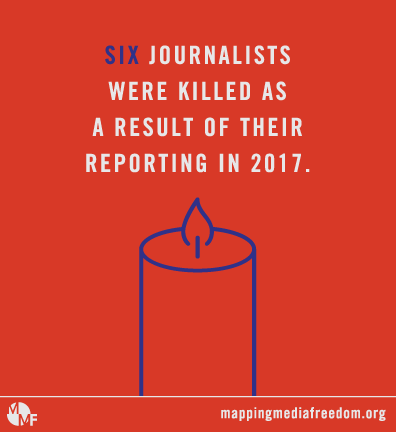 Six journalists were killed as a result of their reporting in 2017.
Six journalists were killed as a result of their reporting in 2017.
Q1: In Russia on 9 March, two unknown individuals approached Nikolai Andrushchenko, an investigative journalist for the weekly newspaper Novyi Petersburg, near his home in St. Petersburg and demanded that he surrender documents and materials from his ongoing investigation into abuses of power by police officers. After the journalist refused, he was physically assaulted by the assailants, who were not apprehended. Andrushchenko refused to file a complaint with the police. A second assault took place a few days later, after which he was found unconscious near his apartment. The journalist never regained consciousness and, following brain surgery, died in hospital as a result of his injuries on 19 April.
On 16 March, in Ulan-Ude, Russia, Yevgeny Khamaganov, the editor-in-chief of Asia-Russia Daily and The Site of the Buryat People died in unexplained circumstances. The cause of death is unclear and no official response has been made. According to local media, Khamaganov was taken to hospital on 10 March because of his diabetes, fell into a coma and died several days later. Some reports cited speculation that he was instead hospitalised after being beaten by unknown assailants. Khamaganov was known for articles critical of the Russian federal government’s policies.
Q2: In Minusinsk, Russia, journalist Dmitri Popkov, editor-in-chief and founder of local newspaper Ton-M, was shot five times and killed on 24 May. His body was found in a sauna in his backyard. Prior to his death, Popkov had told RFE/RL that his newspaper became “an obstacle” for local officials who are now “threatening and intimidating journalists”.
Q3: On 10 August Swedish freelance journalist Kim Wall boarded an experimental submarine in Copenhagen, Denmark, to profile the vessel’s Danish inventor. The following morning, the submarine sank under suspicious circumstances. Peter Madsen, the inventor, told police he had set Wall ashore before the incident. However, between August and October, Wall’s dismembered remains were found washed ashore. Madsen has been charged with the journalist’s murder and with sexual assault.
On 22 September Syrian journalists Orouba Barakat and her daughter Halla Barakat were found dead in their apartment in Istanbul, Turkey. The exact date of the murders is unknown. Orouba Barakat, a journalist, filmmaker and activist, was outspokenly critical of the Syrian regime. Her daughter was a reporter for Alekhbarya TV, news editor for the Orient and a former editor at Turkish state channel TRT World. The pair had received threats from groups associated with the Syrian government. Police reports said they were strangled and then stabbed. The murders are still being investigated by police.
Q4: Maltese journalist Daphne Caruana Galizia was killed when the car she was driving exploded in Bidnija, near Mosta. Caruana Galizia had filed a police report 15 days earlier saying she was being threatened. The journalist had conducted a series of high-profile corruption investigations in Malta and was being sued in relation to her work.
One additional media worker was killed in 2017. On 29 April Saeed Karimian, an Iranian television executive, was shot and killed along with his partner in Istanbul, Turkey.
[/vc_column_text][/vc_column][/vc_row][vc_row][vc_column][vc_custom_heading text=”Physical assaults and injury” use_theme_fonts=”yes”][vc_column_text]
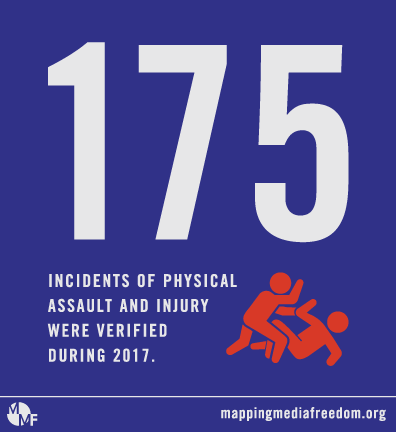 Mapping Media Freedom documented 175 verified incidents of assault and injury, 109 of which occurred in just five countries: Russia (47), Spain (19), Ukraine (18), Italy (15) and France (10).
Mapping Media Freedom documented 175 verified incidents of assault and injury, 109 of which occurred in just five countries: Russia (47), Spain (19), Ukraine (18), Italy (15) and France (10).
On 14 September Taras Khalyava, a local YouTube blogger, was assaulted by three unidentified people near his apartment in Dobropillye, Ukraine. The assailants knocked him to the ground, kicked him and beat him on the head with a steel rod. “I survived because I was wearing a bicycle helmet,” Khalyava told Novosti Donbassa. The blogger has said the attack was related to his work.
On 10 October, Drago Miljus, a Croatian journalist for the news website Index.hr, was pushed by a police officer, who then took his mobile phone and threw it into the sea. Another officer hit the journalist on the head, knocking him to the ground. The incident happened at a beach in Split, where Miljus was covering a story about a man who claimed to have a bomb.
On 23 October, a man broke into Echo Moskvy’s office in the centre of Moscow, Russia, and stabbed programme host Tatiana Felgengauer, who is also one of the editor-in-chief’s deputies, several times in the neck. Felgengauer was hospitalised in a critical condition and underwent several operations. The attacker was sent for psychiatric evaluation.
[/vc_column_text][vc_custom_heading text=”Arrests/Detainments” use_theme_fonts=”yes”][vc_column_text]
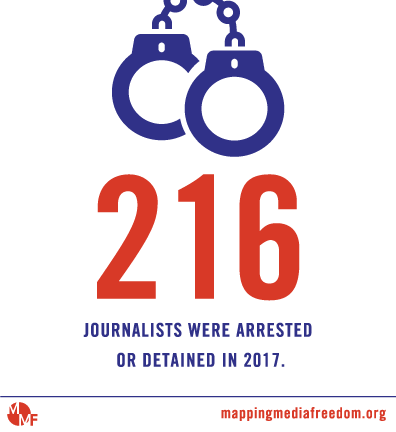 A total of 216 journalists were arrested or detained in 2017, including 21 in Azerbaijan. On 5 July Afgan Mukhtarli was kidnapped from Georgia, where he had lived in self-imposed exile for three years, and taken to Azerbaijan. While in prison, he suffered serious health problems and lost a significant amount of weight. In January 2018 he was sentenced to six years in prison by an Azerbaijani court.
A total of 216 journalists were arrested or detained in 2017, including 21 in Azerbaijan. On 5 July Afgan Mukhtarli was kidnapped from Georgia, where he had lived in self-imposed exile for three years, and taken to Azerbaijan. While in prison, he suffered serious health problems and lost a significant amount of weight. In January 2018 he was sentenced to six years in prison by an Azerbaijani court.
Mapping Media Freedom verified the arrest or detainment of 65 journalists in Russia throughout 2017. The majority of these took place during anti-corruption protests throughout the country organised by opposition figure Alexei Navalny in March and June.
By the close of 2017, 151 journalists were in prison in Turkey, making the country the largest jailer of journalists in the world. On 20 October police took five journalists working for the Kurdish Jin News and Mesopotamia agencies into custody: Jin News editor Sibel Yükler; Jin News reporters Duygu Erol and Habibe Eren; and Mezopotamya Agency reporters Diren Yurtsever and Selman Güzelyüz. Both agencies were launched in late September by staff from organisations shut down during Turkey’s state of emergency.
While only five media workers were arrested or detained in 2017 in the United Kingdom, one case stands out. On 7 December two Kurdish women and two 17-year-old boys were arrested at dawn by armed police in Alexandra Palace and in Crouch End, London. They were questioned about the sale and distribution of the Kurdish-language Yeni Ozgur Politika. All four were arrested on suspicion of funding terrorism, money laundering and fraud.
[/vc_column_text][vc_custom_heading text=”Criminal charges/civil lawsuits” use_theme_fonts=”yes”][vc_column_text]
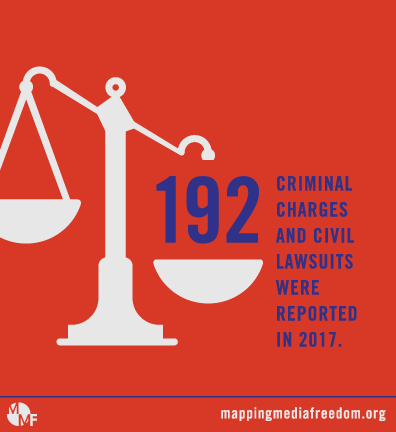 There were 192 cases of criminal charges or civil litigation reported to Mapping Media Freedom in 2017. In Italy, lawsuits demanding millions of euros in damages were filed throughout the year. In March Claudio Riva, former owner of the steelworks company Ilva, sued newspaper Gazzetta del Mezzogiorno for €2.2 million in damages, for publishing an article about pollution allegedly linked to the company’s operations in Taranto. Riva’s lawyers asked for €550,000 in compensation for each of the four damaged parties: Riva Forni Elettrici SPA, Claudio Riva, Fabio Arturo Riva and Nicola Riva. In October Il Locale News was sued for €1 million by Giancarlo Guarrera, an engineer and director of Airgest, the company that manages Trapani airport in Sicily. On 8 November 2016 Il Locale News featured an article on financial issues at Airgest.
There were 192 cases of criminal charges or civil litigation reported to Mapping Media Freedom in 2017. In Italy, lawsuits demanding millions of euros in damages were filed throughout the year. In March Claudio Riva, former owner of the steelworks company Ilva, sued newspaper Gazzetta del Mezzogiorno for €2.2 million in damages, for publishing an article about pollution allegedly linked to the company’s operations in Taranto. Riva’s lawyers asked for €550,000 in compensation for each of the four damaged parties: Riva Forni Elettrici SPA, Claudio Riva, Fabio Arturo Riva and Nicola Riva. In October Il Locale News was sued for €1 million by Giancarlo Guarrera, an engineer and director of Airgest, the company that manages Trapani airport in Sicily. On 8 November 2016 Il Locale News featured an article on financial issues at Airgest.
In Spain, wealthy businessman Alvaro de Marichalar filed legal action against freelance journalist Sabina Urraca in March, demanding she pay €30,000 in damages for an article she wrote after accompanying him on a trip. In July Hermann Tertsch, a columnist for daily newspaper ABC, was ordered by a court in Zamora to pay €12,000 to Javier Iglesias for “unlawfully offending the honour” of his father Manuel. Javier Iglesias is the father of Pablo Iglesias, the leader of the left-wing Podemos party, the third largest party in the Spanish parliament.
[/vc_column_text][vc_custom_heading text=”Legal measures” use_theme_fonts=”yes”][vc_column_text]
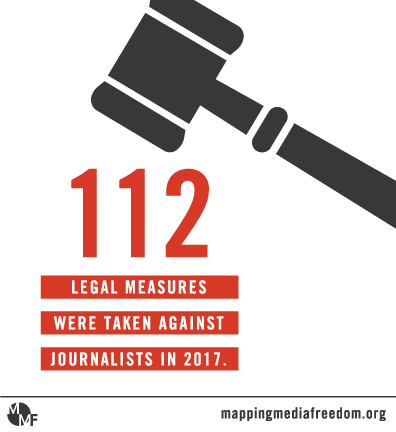 There were 112 legal measures taken against journalists in 2017. In the United Kingdom, the offshore company Appleby, which was at the heart of the Panama Papers scandal, launched breach of confidence proceedings against the Guardian and the BBC on 18 December, in an attempt to force them to disclose the documents used in the investigation. Appleby said the documents were stolen in a cyberattack and there was no public interest in the revealing of their contents.
There were 112 legal measures taken against journalists in 2017. In the United Kingdom, the offshore company Appleby, which was at the heart of the Panama Papers scandal, launched breach of confidence proceedings against the Guardian and the BBC on 18 December, in an attempt to force them to disclose the documents used in the investigation. Appleby said the documents were stolen in a cyberattack and there was no public interest in the revealing of their contents.
In February the UK government proposed extending jail time for journalists who have obtained leaked official documents to up to 14 years. The major overhaul of the Official Secrets Act – to be replaced by an updated Espionage Act – would give courts the power to increase jail terms against journalists receiving such material. Should the law get approval, documents containing “sensitive information” about the economy could fall foul of national security laws for the first time. Jodie Ginsberg, chief executive of Index on Censorship, said: “It is unthinkable that whistleblowers and those to whom they reveal their information should face jail for leaking and receiving information that is in the public interest.”
In November, after the US added several media outlets funded by the Russian state on a list of foreign agents, Russia adopted a new restrictive law against foreign media that allows such journalists and organisations to be recognised as foreign agents, which makes them subject to numerous additional checks and obliges them to mark their content as being produced by a foreign agent.
[/vc_column_text][vc_custom_heading text=”Job loss” use_theme_fonts=”yes”][vc_column_text]
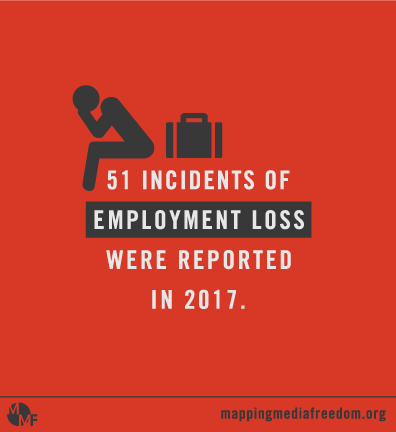 There were 51 reports of job loss recorded on Mapping Media Freedom throughout 2017, more than half of which came from Russia (13), Poland (8) and Spain (5).
There were 51 reports of job loss recorded on Mapping Media Freedom throughout 2017, more than half of which came from Russia (13), Poland (8) and Spain (5).
In Poland, Michał Fabisiak, a journalist for the public media outlet Polskie Radio, was fired for refusing to reveal the source of information for an article about an alleged internal survey in the Law and Justice (PiS) party, measuring support for potential PiS candidates in municipal elections in 2018.
Eleven days later, Barbara Burdzy, a Polish journalist for the public media outlet TVP Info, was dismissed after she published an article stating that the intelligence service, under the minister of defence Antoni Macierewicz, lied when claiming that deputy minister Jacek Kotas was not involved in property restoration in Warsaw.
On 14 December a documentary critical of Togo’s president was removed from the website of the French cable television channel Canal Plus and two employees of the channel were subsequently dismissed. Faure Gnassingbé, the president of Togo, is a friend of Vincent Bolloré, French businessman and chairman of Canal Plus’ parent company Vivendi. The documentary, entitled Let Go of the Throne, focused on ongoing protests against the country’s president. In November it was aired on Canal Afrique, a decision attributed to an employee who was later fired. François Deplanck, head of channels and content at Canal Plus International was also dismissed.
[/vc_column_text][vc_custom_heading text=”Intimidation” use_theme_fonts=”yes”][vc_column_text]
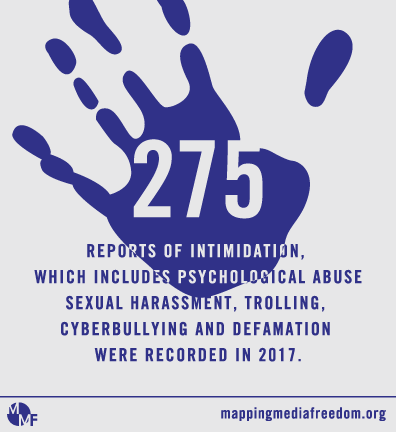 Intimidation was widespread across Europe in 2017, with 275 incidents reported to the map. In the United Kingdom, the BBC’s political editor Laura Kuenssberg was assigned a security detail at the Labour party conference in late September following online threats and abuse. The journalist attracted anger from some Labour supporters for her coverage of the 2016 Labour leadership race and the party’s poor performance in local elections, while a petition for her to be fired received 35,000 signatures.
Intimidation was widespread across Europe in 2017, with 275 incidents reported to the map. In the United Kingdom, the BBC’s political editor Laura Kuenssberg was assigned a security detail at the Labour party conference in late September following online threats and abuse. The journalist attracted anger from some Labour supporters for her coverage of the 2016 Labour leadership race and the party’s poor performance in local elections, while a petition for her to be fired received 35,000 signatures.
Kuenssberg — the first woman to lead political coverage at the public broadcaster — also reported that she had bolstered her security during the general election in June 2017 after receiving threats over her coverage of Labour Party leader Jeremy Corbyn.
[/vc_column_text][vc_custom_heading text=”Attacks to property” use_theme_fonts=”yes”][vc_column_text]
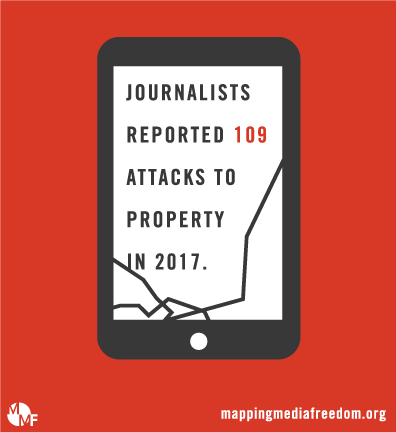 There were 109 attacks on the property of journalists in 2017. On the morning of 26 November Yulia Zavialova, editor-in-chief of the Russian investigative website Bloknot Volgograd, known for its coverage of political and business corruption, asked her father to have the tires on her car checked. Thirty minutes later he rang her to say the brakes were completely out of service. Her brakes had been cut and her anti-lock braking system was damaged. Zavialova called the police but, according to the journalist, they did not properly investigate the scene, failing to take fingerprints or full details of the damage.
There were 109 attacks on the property of journalists in 2017. On the morning of 26 November Yulia Zavialova, editor-in-chief of the Russian investigative website Bloknot Volgograd, known for its coverage of political and business corruption, asked her father to have the tires on her car checked. Thirty minutes later he rang her to say the brakes were completely out of service. Her brakes had been cut and her anti-lock braking system was damaged. Zavialova called the police but, according to the journalist, they did not properly investigate the scene, failing to take fingerprints or full details of the damage.
Supporters of the Italian far-right party Forza Nuova attacked the offices of the left-wing newspaper La Repubblica in Rome on 6 December. The party declared “war” on L’Espresso Group, the newspaper’s publisher, through a Facebook post. During the protest, Forza Nuova supporters threw flares at La Repubblica’s office while carrying a banner reading “Boycott L’Espresso and La Repubblica”. Members of the group read a statement denouncing journalists employed there.
[/vc_column_text][vc_custom_heading text=”Blocked access” use_theme_fonts=”yes”][vc_column_text]
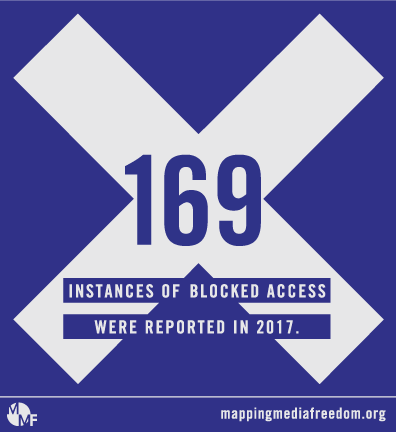 There were 169 confirmed cases of blocked access throughout Europe in 2017, in which journalists were expelled from a location or prevented from speaking to a source by way of obstruction. Many of these reports were connected to other violations, such as assault, damage to property and intimidation.
There were 169 confirmed cases of blocked access throughout Europe in 2017, in which journalists were expelled from a location or prevented from speaking to a source by way of obstruction. Many of these reports were connected to other violations, such as assault, damage to property and intimidation.
Throughout Europe, journalists were blocked from attending events by political parties, including the Labour Party’s annual conference in Brighton, United Kingdom, in September. Sussex police refused to grant Huck Magazine news editor Michael Segalov the security clearance he needed to attend. The journalist had applied for press accreditation three months prior but was informed on 19 September that it had been denied by police on security grounds. “Rather than provide reasons and rationale for our journalistic freedom being curtailed, the police said they would not divulge why they made their call,” Segalov wrote. The journalist has never been arrested, charged or convicted of a crime. Michael Walker, a journalist working for the left-wing Novara Media, was also barred by police from entering the conference.
On 25 October three journalists working for Echo TV in Hungary were banned from entering the country’s parliament. The parliament press office said the journalists had broken official rules multiple times by filming in areas closed to the media.
[/vc_column_text][vc_custom_heading text=”Work censored or altered” use_theme_fonts=”yes”][vc_column_text]
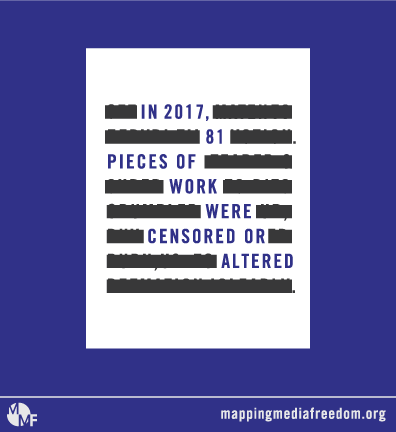 In 2017 Mapping Media Freedom documented 81 cases in which journalists had their work censored or altered. On 15 October in the city of Uppsala, Sweden, local newspaper UNT and public broadcaster SVT identified what they saw as a concerted effort by press officers at the local council to control statements made by staff to journalists. Both complained that press officers were exerting pressure on staff to change statements that reflect badly on the council.
In 2017 Mapping Media Freedom documented 81 cases in which journalists had their work censored or altered. On 15 October in the city of Uppsala, Sweden, local newspaper UNT and public broadcaster SVT identified what they saw as a concerted effort by press officers at the local council to control statements made by staff to journalists. Both complained that press officers were exerting pressure on staff to change statements that reflect badly on the council.
On 4 November the Spanish newspaper El País removed a column from its website that questioned and criticised allegations of sexual harassment in the film industry against the likes of Kevin Spacey, Harvey Weinstein and Roman Polanski.
On 19 December the Malta Independent, a Maltese newspaper and publishing house, announced it would remove some online content relating to a whistleblower at Pilatus Bank due to the threat of a multi-million euro lawsuit from the bank. Pilatus Bank first threatened the independent publishing house in mid-October, with lawsuits in the USA and United Kingdom.
[/vc_column_text][vc_separator color=”black” style=”dashed”][vc_column_text]
CASE STUDIES
2018 WATCH LIST
Index on Censorship is especially disturbed by the five countries on the map with over 60 violations in 2017. These are:
Russia (197)
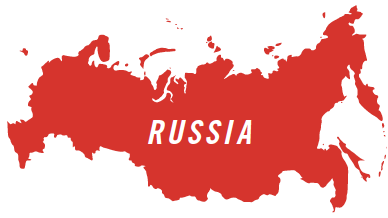 During protests organised by Russian lawyer and activist Alexei Navalny in March and June, 1,000 people were arrested, including 19 journalists, in Moscow, St. Petersburg, Makhachkala, Petrozavodsk and Samara. At a rally in Moscow on 26 March, police detained RBC correspondent Timofey Dzyadko, Mediazona publisher Piotr Verzilov, Open Russia correspondent Sofiko Arifdzhanova, Public Television of Russia journalist Olga Orlova, Echo of Moscow journalist Alexandr Pluschev and Kommersant-FM reporter Pyotr Parkhomenko. At the same rally, Guardian correspondent Alec Luhn was detained after he took a photo of a protester being arrested. He spent more than five hours at a police station without an explanation of why he was detained. Luhn was eventually charged with participating in an unsanctioned rally, even though he showed officers his press accreditation. At least nine media workers were detained across Russia on 8 October during further protests organised by Navalny.
During protests organised by Russian lawyer and activist Alexei Navalny in March and June, 1,000 people were arrested, including 19 journalists, in Moscow, St. Petersburg, Makhachkala, Petrozavodsk and Samara. At a rally in Moscow on 26 March, police detained RBC correspondent Timofey Dzyadko, Mediazona publisher Piotr Verzilov, Open Russia correspondent Sofiko Arifdzhanova, Public Television of Russia journalist Olga Orlova, Echo of Moscow journalist Alexandr Pluschev and Kommersant-FM reporter Pyotr Parkhomenko. At the same rally, Guardian correspondent Alec Luhn was detained after he took a photo of a protester being arrested. He spent more than five hours at a police station without an explanation of why he was detained. Luhn was eventually charged with participating in an unsanctioned rally, even though he showed officers his press accreditation. At least nine media workers were detained across Russia on 8 October during further protests organised by Navalny.
On 20 December photographers Andrey Zolotov and Denis Bochkarev, along with Maria Alyokhina, a member of punk collective Pussy Riot, were detained during a protest at the entrance of the FSB, the Russian federal security service. All three were taken to the nearest police station, where Alyokhina and Bochkaryov spent the night ahead of an administrative hearing.
Often referred to as the only independent radio station in Russia, Echo Moskvy was subjected to significant pressure and harassment throughout 2017, with Mapping Media Freedom verifying 15 reports against the station including one radio host stabbed, two journalists fleeing the country after threats, several detained and an American company forced to withdraw funding from the station.
Turkey
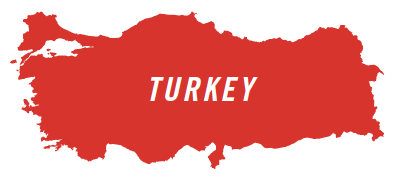 Although the number of violations reported to Mapping Media Freedom that took place in Turkey decreased between 2016 and 2017 — from 231 to 135 — the country remains the number one jailer of journalists in the world with 151 media workers behind bars by the end of 2017. In all, 65 journalists were jailed and sentenced on charges including the spreading of terrorist propaganda. At the trial of journalist Nedim Türfent, who reported on security operations in Turkey’s Kurdish majority provinces, at least a dozen people claimed they were tortured by police.
Although the number of violations reported to Mapping Media Freedom that took place in Turkey decreased between 2016 and 2017 — from 231 to 135 — the country remains the number one jailer of journalists in the world with 151 media workers behind bars by the end of 2017. In all, 65 journalists were jailed and sentenced on charges including the spreading of terrorist propaganda. At the trial of journalist Nedim Türfent, who reported on security operations in Turkey’s Kurdish majority provinces, at least a dozen people claimed they were tortured by police.
In November, Turkish journalists Ahmet Altan and Mehmet Altan’s defence attorneys were forced to leave the courtroom as their clients stood trial, accused of taking part in Turkey’s failed 2016 coup. Both brothers are prominent Turkish journalists, known for their critical reporting on president Erdogan’s regime. Without lawyers present, the court then ruled that the Altan brothers — along with four other journalists — would remain in pretrial detention. On 16 February 2018 they were sentenced to aggravated life sentences.
Belarus
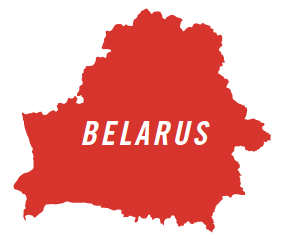 A total of 92 violations of media freedom were recorded in Belarus throughout 2017, including the detainment of 101 journalists. In all, 30 journalists received criminal charges. A wave of detentions occurred on the Belarusian holiday Freedom Day on 25 March, when 36 journalists were placed in custody. Olga Morva, Philip Warwick, Andrey Dubinin, Valery Shchukin, Katsiaryna Bakhvalava, Ihar Ilyash and Volha Davydava said they were beaten by police while under arrest. Warwick, from the United Kingdom, said he was denied the right to contact his embassy after being handcuffed and hit in the face; he spent over six hours at the police station. The apartment of journalist Maryna Kastylyanchanka, who works with human rights organisations, was searched. She was later jailed for 15 days for disobeying police and participating in the unsanctioned mass protests.
A total of 92 violations of media freedom were recorded in Belarus throughout 2017, including the detainment of 101 journalists. In all, 30 journalists received criminal charges. A wave of detentions occurred on the Belarusian holiday Freedom Day on 25 March, when 36 journalists were placed in custody. Olga Morva, Philip Warwick, Andrey Dubinin, Valery Shchukin, Katsiaryna Bakhvalava, Ihar Ilyash and Volha Davydava said they were beaten by police while under arrest. Warwick, from the United Kingdom, said he was denied the right to contact his embassy after being handcuffed and hit in the face; he spent over six hours at the police station. The apartment of journalist Maryna Kastylyanchanka, who works with human rights organisations, was searched. She was later jailed for 15 days for disobeying police and participating in the unsanctioned mass protests.
Throughout the year, 69 fines were administered to journalists for violating Article 22.9 of Belarus’ Code of Administrative Offences on the illegal production and/or distribution of media content.
Ukraine
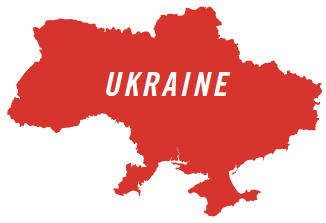 In all, 74 violations against the media in Ukraine were reported to Mapping Media Freedom in 2017. One of the most worrying trends included the treatment of foreign journalists or journalists working for Russian companies. Sixteen journalists were expelled from, or not allowed to enter the country, including some who worked for Russian state media outlets. There were three cases involving the abuse of Interpol warrants to arrest or detain foreign journalists in Ukraine by their countries of origin as a means of silencing critical voices. These were: Azerbaijan, Uzbekistan and Kazakhstan. Three journalists were arrested in territory controlled by self-proclaimed separatists in 2017, including Ukrainian blogger and writer Stanyslav Aseev, one of the few journalists contributing to western and independent media outlets in eastern Ukraine.
In all, 74 violations against the media in Ukraine were reported to Mapping Media Freedom in 2017. One of the most worrying trends included the treatment of foreign journalists or journalists working for Russian companies. Sixteen journalists were expelled from, or not allowed to enter the country, including some who worked for Russian state media outlets. There were three cases involving the abuse of Interpol warrants to arrest or detain foreign journalists in Ukraine by their countries of origin as a means of silencing critical voices. These were: Azerbaijan, Uzbekistan and Kazakhstan. Three journalists were arrested in territory controlled by self-proclaimed separatists in 2017, including Ukrainian blogger and writer Stanyslav Aseev, one of the few journalists contributing to western and independent media outlets in eastern Ukraine.
Ukrainian president Petro Poroshenko signed a National Security and Defence Council decree in May that banned a number of Russian social media sites such as VKontakte and Odnoklassniki, along with the search engine Yandex and email service Mail.ru.
“The lack of safety for journalists in Ukraine, whether direct attacks or obstruction, remains a problem, and the level of response by the authorities is telling because too often the perpetrators go unpunished,” Vitalii Atanasov, Mapping Media Freedom correspondent for Ukraine, said. “The murder of prominent journalist Pavel Sheremet in July 2016 has not yet been properly investigated, while media workers continue to face pressure from the authorities, politicians and other influential actors. It is important to emphasise to that while the Mapping Media Freedom reflects the most disturbing and characteristic cases, it does not claim to be complete.”
Spain
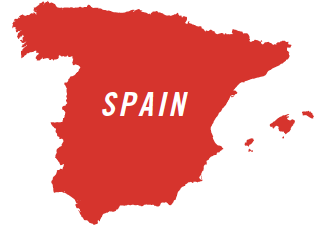 Between 2016 and 2017, media freedom violations in Spain increased from 56 to 66. Journalists experienced difficulties before, during and after the referendum on Catalan independence on 1 October. In July the daily newspaper La Vanguardia, based in Barcelona, refused to publish a column written by Gregorio Morán in which the journalist criticised the “corrupt” regional government of Catalonia. Morán also accused the Catalan media of receiving sums of public money, adding that it was therefore no surprise to see them supporting Catalan independence.
Between 2016 and 2017, media freedom violations in Spain increased from 56 to 66. Journalists experienced difficulties before, during and after the referendum on Catalan independence on 1 October. In July the daily newspaper La Vanguardia, based in Barcelona, refused to publish a column written by Gregorio Morán in which the journalist criticised the “corrupt” regional government of Catalonia. Morán also accused the Catalan media of receiving sums of public money, adding that it was therefore no surprise to see them supporting Catalan independence.
On the day of the referendum Mapping Media Freedom recorded five separate violations of media freedom. Journalists were among the many victims of violence by heavy-handed police deployed the Spanish government, who declared the referendum to be illegal. Xabi Barrena, a journalist for the newspaper El Periódico, was assaulted by Spanish national police while reporting on voters being evicted from a polling station in Barcelona. He was struck with a baton, knocked to the ground and kicked by police.
In the days following the referendum, media violations were widespread during the protests that swept parts of the country. On 2 October, for example, Ana Cuesta and José Yelámo, reporters for television La Sexta, were surrounded by protesters who chanted “Spanish press manipulators” and “assassins” during live coverage.
[/vc_column_text][vc_column_text]
TRENDS
Threats from the far-right
The far right has a record of violating freedom of the press throughout Europe, with 24 media violations across 13 countries involving far-right groups or activists in 2017.
Twelve attempts were made by the far-right to intimidate media workers. At the start of December, the Serbian journalist Marija Antic, a television host for the broadcaster N1, received death and rape threats on social media after interviewing a French-Serbian far-right activist. Antic had invited Arnaud Gouillon, who is known for his support for Serbs in Kosovo, to her talk show. During the interview, Antic asked him about his past involvement in the French far-right group Les Identitaires and about his connections with far-right Serbian groups after he attended some of their events. After the interview, Gouillon accused Antic of demonising him. Soon after, Antic received multiple threats on social media.
On six occasions, far-right groups attempted to defame journalists throughout Europe. This was the case on 15 March when Stina Blomgren, a Swedish journalist working for the state broadcaster SVT, was accused by the popular Swedish-Russian far-right blogger Egor Putilov of lying and creating fake reports about the risks Syrian migrants faced when trying to reach Sweden. Putilov claimed to have visited Egypt and uncovered inaccuracies in an article published by Blomgren in August.
In 2017 four reports made to Mapping Media Freedom involved violence from the far right and four involved attacks to property. These ranged from damages to camera equipment to an assault with a metal pipe.
Corruption
Corruption is a major issue in the EU and neighbouring countries, undermining democracy and putting people at risk. Journalists play a key role in uncovering and fighting corruption through their investigations and, as a result, put themselves in danger. In all, 67 cases of media workers facing difficulty in their reporting on corruption were recorded throughout 2017.
On 16 August, for instance, Parim Olluri, editor-in-chief of investigative website Insajderi, was physically assaulted by unknown individuals outside his home in Kosovo’s capital Pristina. Olluri believes the attack was linked to his work. A few days before the assault, Olluri had published an editorial about corruption allegations against former Kosovo Liberation Army commanders, after which he received a torrent of abuse and threats on social media.
On 16 October the Maltese journalist Daphne Caruana Galizia was murdered when the car she was driving exploded. On 11 March Silvio Debono, owner of real estate investment company DB Group, filed 19 libel cases against her. Caruana Galizia published a number of articles on her blog discussing a business deal between the developer and Malta’s government to take over a tract of public land on which he had planned to build a Hard Rock Hotel and two towers of flats for sale. Caruana Galizia also conducted an investigation allegedly linking prime minister Joseph Muscat and his wife to the Panama Papers scandal.
Harassment of female journalists
Mapping Media Freedom logged 10 cases where women journalists reported they suffered sexual harassment throughout 2017, from politicians, anonymous sources and fellow journalists alike. In February the Swedish newspaper journalist Evelyn Schreiber was subjected to persistent death threats and threats of sexual violence after questioning local police officer a Peter Springare’s assertion that immigrants were responsible for a spike in violent crime in Örebro, Sweden. Within 24 hours of her report, Schreiber received over 200 emails containing threats.
On 7 May Loes Reijmer, a journalist and columnist for the Dutch daily newspaper De Volkskrant, faced abuse after the popular right-wing blog GeenStijl published a photo of her with the text: “Would you do her?” Thousands of readers responded in the comments section, many containing sexual references and rape threats. Reijmer had published several articles critical of GeenStijl, which is owned by Telegraaf Media Group and is one of the top 10 most popular news sites in the Netherlands.
On 30 November, Dzenan Selimbegovic, a deputy secretary general of the presidency of Bosnia and Herzegovina, used offensive language to describe Sanele Prašović Gadžo, a journalist for the public broadcaster BHT, and Arijana Saračević-Helać, a journalist for the public broadcaster FTV, in a Facebook post. The comments followed a trailer aired on BHT for Gadžo’s interview with Saračević-Helać on her talk show.
Commercial interference
In 2017 Index on Censorship added the “commercial interference” category to Mapping Media Freedom to monitor actions that use money and/or financial pressure to influence editorial decisions of a media or news outlet. One of the most concerning issues highlighted was the lack of plurality in media ownership in Ireland and the impact this can have on the public’s right to information.
Broadcasting in the country is dominated by just two organisations, RTÉ and Communicorp. Semi-state RTÉ services are the most popular on television and radio, while businessman Denis O’Brien’s Communicorp owns the largest commercial news radio stations – Newstalk and Today FM, among others. There is currently a lack of imperative for reform on the issue of the concentration of media ownership by the Irish government, leaving journalists open to further pressure and self-censorship to suit commercial interests, according to the National Union of Journalists.
Across Europe commercial interference in the media is proving to be a growing problem. On 6 December in Nantes, France, for example, managers of McDonald’s restaurants were asked to remove a page from local newspaper Ouest France that contained an article about litigation between the fast food restaurant chain and two of its workers, who had campaigned for union representation.
[/vc_column_text][vc_column_text]
CONCLUSIONS AND RECOMMENDATIONS
Mapping Media Freedom’s annual report highlights issues affecting the state of press freedom throughout Europe in 2017. Index on Censorship urges that the following steps be taken.
-
All journalists, media workers and others arrested for exercising their right to freedom of expression must be immediately and unconditionally released. We make this plea directly to the Turkish government in particular, which has become the largest jailer of journalists not just among the countries monitored by Mapping Media Freedom, but the entire world.
-
Laws designed to impinge on the work of journalists must be reconsidered, whether amended or abolished. This includes defamation laws, hate speech laws and terror and security-related legislation. Lawmakers should also ensure that new or revised laws do not encroach on the work of journalists.
-
Governments must respect the right of journalists to protect confidential information and sources. This is vital, especially in cases involving whistleblowing in the public interest.
-
Harassment and crimes against journalists must be properly investigated and those responsible should be prosecuted to prevent the further proliferation of impunity.
-
Governments should do more to ensure the protection of media workers who are women.
[/vc_column_text][vc_column_text]
[/vc_column_text][/vc_column][/vc_row][vc_row equal_height=”yes” css=”.vc_custom_1521129408155{background-color: #d5473c !important;}”][vc_column width=”1/2″][vc_custom_heading text=”Protect media freedom”][vc_column_text]
We monitor threats to press freedom, produce an award-winning magazine and publish work by censored writers.[/vc_column_text][/vc_column][vc_column width=”1/2″ css=”.vc_custom_1521129253575{background-image: url(https://www.indexoncensorship.org/wp-content/uploads/2018/03/MMF_2017_map-standalone.jpg?id=98665) !important;}”][/vc_column][/vc_row][vc_row][vc_column][vc_empty_space][/vc_column][/vc_row]
19 Jan 18 | Campaigns -- Featured, Malta, Statements
[vc_row][vc_column][vc_column_text]On 19 January, Index on Censorship joined a letter calling on the Parliamentary Assembly of the Council of Europe to appoint a Special Rapporteur to monitor the investigation into the murder of Maltese investigative journalist Daphne Caruana Galizia, killed by a car bomb on 16 October 2017.
Joint open letter to the members of the Parliamentary Assembly of the Council of Europe: Call for a PACE Special Rapporteur on Daphne Caruana Galizia’s assassination and the crimes she exposed
Dear Members of the Parliamentary Assembly of the Council of Europe,
Daphne Caruana Galizia was by all accounts Malta’s most widely read and influential journalist. She had an immeasurable impact on Malta’s politics over the course of her thirty-year career and single-handedly uncovered some of the country’s biggest corruption scandals, exposing Maltese institutions for their unwillingness to pursue powerful and well-connected members of the country’s business and political class.
Known by her hundreds of thousands of readers in Malta and elsewhere simply as ‘Daphne’, she was assassinated on 16 October 2017 in broad daylight by a remote-controlled car bomb as she left her home in Malta.
Only months before, Daphne Caruana Galizia had uncovered systemic government corruption implicating senior members of her country’s government, showing how offshore structures exposed in the Panama Papers were used to receive and launder kickbacks on the sale of Maltese passports and process unexplained payments from members of Azerbaijan’s ruling family.
In a January 2018 report of a European Parliament fact-finding mission to Malta, the country’s Commissioner of Police confirmed on record that no police investigations took place into any of Daphne Caruana Galizia’s Panama Papers revelations. The senior government figures implicated in her investigative reporting remain in public office.
In a context of complete impunity for the high-level corruption Daphne Caruana Galizia exposed and the legal, financial and other threats she faced from figures in or close to government before her assassination, her killing has underlined in shocking fashion the extent of corruption and rule of law failings in Malta. The threat to the country’s liberal democracy and press freedom is a real one: Malta has slipped sixteen places in a single year in Freedom House’s latest global ranking.
Daphne Caruana Galizia’s violent death and the impunity for the crimes she revealed have serious consequences in the most fundamental areas of the work of the Parliamentary Assembly of the Council of Europe.
At the winter session in Strasbourg, Daphne Caruana Galizia’s three sons will be calling for a special rapporteur to be appointed whose mandate will involve monitoring the ongoing murder investigation in Malta, investigating the broader circumstances surrounding Daphne Caruana Galizia’s death, and ensuring there is no impunity for the perpetrators of the crimes Daphne Caruana Galizia exposed.
We ask you to heed their call and to support their efforts in every possible way in the interests of all of us who work to see justice and bring an end to impunity.
Yours sincerely,
- Ricardo Gutiérrez, General Secretary, European Federation of Journalists (EFJ)
- Antoine Bernard, Deputy Director General of Reporters Without Borders (RSF)
- Patricia Moreira, Managing Director, Transparency International
- Barbara Trionfi, Executive Director, International Press Institute (IPI)
- Carles Torner, Executive Director, PEN International
- Tom Gibson, EU Representative, Committee to Protect Journalists (CPJ)
- Anna Bevan, Assistant Director, International News Safety Institute (INSI)
- Ernest Sagaga, Head of Human Rights and Safety, International Federation of Journalists (IFJ)
- Joy Hyvarinen, Head of Advocacy, Index on Censorship
- Natalia Yerashevich, Director of the Secretariat, Eastern Partnership Civil Society Forum
- Katie Morris, Head of Europe and Central Asia, ARTICLE 19
- Antonia Byatt, Interim Director, English PEN
- Dr Lutz Kinkel, European Centre for Press and Media Freedom (ECPMF)
- William Horsley, VP and Media Freedom Representative, Association of European Journalists (AEJ)
[/vc_column_text][/vc_column][/vc_row][vc_row][vc_column][vc_basic_grid post_type=”post” max_items=”6″ style=”load-more” items_per_page=”2″ element_width=”12″ grid_id=”vc_gid:1516623064760-9c9f608a-54cc-1″ taxonomies=”18782″][/vc_column][/vc_row]
![]() SUBSCRIBE NOW[/vc_column_text][/vc_column][/vc_row][vc_row][vc_column][/vc_column][/vc_row]
SUBSCRIBE NOW[/vc_column_text][/vc_column][/vc_row][vc_row][vc_column][/vc_column][/vc_row] Six journalists were killed as a result of their reporting in 2017.
Six journalists were killed as a result of their reporting in 2017.  Mapping Media Freedom documented 175 verified incidents of assault and injury, 109 of which occurred in just five countries: Russia (47), Spain (19), Ukraine (18), Italy (15) and France (10).
Mapping Media Freedom documented 175 verified incidents of assault and injury, 109 of which occurred in just five countries: Russia (47), Spain (19), Ukraine (18), Italy (15) and France (10).  A total of 216 journalists were arrested or detained in 2017, including 21 in Azerbaijan. On 5 July Afgan Mukhtarli was kidnapped from Georgia, where he had lived in self-imposed exile for three years, and taken to Azerbaijan. While in prison, he suffered serious health problems and lost a significant amount of weight. In January 2018 he was sentenced to six years in prison by an Azerbaijani court.
A total of 216 journalists were arrested or detained in 2017, including 21 in Azerbaijan. On 5 July Afgan Mukhtarli was kidnapped from Georgia, where he had lived in self-imposed exile for three years, and taken to Azerbaijan. While in prison, he suffered serious health problems and lost a significant amount of weight. In January 2018 he was sentenced to six years in prison by an Azerbaijani court.  There were 192 cases of criminal charges or civil litigation reported to Mapping Media Freedom in 2017. In Italy, lawsuits demanding millions of euros in damages were filed throughout the year. In March Claudio Riva, former owner of the steelworks company Ilva, sued newspaper Gazzetta del Mezzogiorno for €2.2 million in damages, for publishing an article about pollution allegedly linked to the company’s operations in Taranto. Riva’s lawyers asked for €550,000 in compensation for each of the four damaged parties: Riva Forni Elettrici SPA, Claudio Riva, Fabio Arturo Riva and Nicola Riva. In October Il Locale News was sued for €1 million by Giancarlo Guarrera, an engineer and director of Airgest, the company that manages Trapani airport in Sicily. On 8 November 2016 Il Locale News featured an article on financial issues at Airgest.
There were 192 cases of criminal charges or civil litigation reported to Mapping Media Freedom in 2017. In Italy, lawsuits demanding millions of euros in damages were filed throughout the year. In March Claudio Riva, former owner of the steelworks company Ilva, sued newspaper Gazzetta del Mezzogiorno for €2.2 million in damages, for publishing an article about pollution allegedly linked to the company’s operations in Taranto. Riva’s lawyers asked for €550,000 in compensation for each of the four damaged parties: Riva Forni Elettrici SPA, Claudio Riva, Fabio Arturo Riva and Nicola Riva. In October Il Locale News was sued for €1 million by Giancarlo Guarrera, an engineer and director of Airgest, the company that manages Trapani airport in Sicily. On 8 November 2016 Il Locale News featured an article on financial issues at Airgest.  There were 112 legal measures taken against journalists in 2017. In the United Kingdom, the offshore company Appleby, which was at the heart of the Panama Papers scandal, launched breach of confidence proceedings against the Guardian and the BBC on 18 December, in an attempt to force them to disclose the documents used in the investigation. Appleby said the documents were stolen in a cyberattack and there was no public interest in the revealing of their contents.
There were 112 legal measures taken against journalists in 2017. In the United Kingdom, the offshore company Appleby, which was at the heart of the Panama Papers scandal, launched breach of confidence proceedings against the Guardian and the BBC on 18 December, in an attempt to force them to disclose the documents used in the investigation. Appleby said the documents were stolen in a cyberattack and there was no public interest in the revealing of their contents. There were 51 reports of job loss recorded on Mapping Media Freedom throughout 2017, more than half of which came from Russia (13), Poland (8) and Spain (5).
There were 51 reports of job loss recorded on Mapping Media Freedom throughout 2017, more than half of which came from Russia (13), Poland (8) and Spain (5).  Intimidation was widespread across Europe in 2017, with 275 incidents reported to the map. In the United Kingdom, the BBC’s political editor Laura Kuenssberg was assigned a security detail at the Labour party conference in late September following online threats and abuse. The journalist attracted anger from some Labour supporters for her coverage of the 2016 Labour leadership race and the party’s poor performance in local elections, while a petition for her to be fired received 35,000 signatures.
Intimidation was widespread across Europe in 2017, with 275 incidents reported to the map. In the United Kingdom, the BBC’s political editor Laura Kuenssberg was assigned a security detail at the Labour party conference in late September following online threats and abuse. The journalist attracted anger from some Labour supporters for her coverage of the 2016 Labour leadership race and the party’s poor performance in local elections, while a petition for her to be fired received 35,000 signatures. There were 109 attacks on the property of journalists in 2017. On the morning of 26 November Yulia Zavialova, editor-in-chief of the Russian investigative website Bloknot Volgograd, known for its coverage of political and business corruption, asked her father to have the tires on her car checked. Thirty minutes later he rang her to say the brakes were completely out of service. Her brakes had been cut and her anti-lock braking system was damaged. Zavialova called the police but, according to the journalist, they did not properly investigate the scene, failing to take fingerprints or full details of the damage.
There were 109 attacks on the property of journalists in 2017. On the morning of 26 November Yulia Zavialova, editor-in-chief of the Russian investigative website Bloknot Volgograd, known for its coverage of political and business corruption, asked her father to have the tires on her car checked. Thirty minutes later he rang her to say the brakes were completely out of service. Her brakes had been cut and her anti-lock braking system was damaged. Zavialova called the police but, according to the journalist, they did not properly investigate the scene, failing to take fingerprints or full details of the damage. There were 169 confirmed cases of blocked access throughout Europe in 2017, in which journalists were expelled from a location or prevented from speaking to a source by way of obstruction. Many of these reports were connected to other violations, such as assault, damage to property and intimidation.
There were 169 confirmed cases of blocked access throughout Europe in 2017, in which journalists were expelled from a location or prevented from speaking to a source by way of obstruction. Many of these reports were connected to other violations, such as assault, damage to property and intimidation.  In 2017 Mapping Media Freedom documented 81 cases in which journalists had their work censored or altered. On 15 October in the city of Uppsala, Sweden, local newspaper UNT and public broadcaster SVT identified what they saw as a concerted effort by press officers at the local council to control statements made by staff to journalists. Both complained that press officers were exerting pressure on staff to change statements that reflect badly on the council.
In 2017 Mapping Media Freedom documented 81 cases in which journalists had their work censored or altered. On 15 October in the city of Uppsala, Sweden, local newspaper UNT and public broadcaster SVT identified what they saw as a concerted effort by press officers at the local council to control statements made by staff to journalists. Both complained that press officers were exerting pressure on staff to change statements that reflect badly on the council. During protests organised by Russian lawyer and activist Alexei Navalny in March and June, 1,000 people were arrested, including 19 journalists, in Moscow, St. Petersburg, Makhachkala, Petrozavodsk and Samara. At a rally in Moscow on 26 March, police detained RBC correspondent Timofey Dzyadko, Mediazona publisher Piotr Verzilov, Open Russia correspondent Sofiko Arifdzhanova, Public Television of Russia journalist Olga Orlova, Echo of Moscow journalist Alexandr Pluschev and Kommersant-FM reporter Pyotr Parkhomenko. At the same rally, Guardian correspondent Alec Luhn was detained after he took a photo of a protester being arrested. He spent more than five hours at a police station without an explanation of why he was detained. Luhn was eventually charged with participating in an unsanctioned rally, even though he showed officers his press accreditation. At least nine media workers were detained across Russia on 8 October during further protests organised by Navalny.
During protests organised by Russian lawyer and activist Alexei Navalny in March and June, 1,000 people were arrested, including 19 journalists, in Moscow, St. Petersburg, Makhachkala, Petrozavodsk and Samara. At a rally in Moscow on 26 March, police detained RBC correspondent Timofey Dzyadko, Mediazona publisher Piotr Verzilov, Open Russia correspondent Sofiko Arifdzhanova, Public Television of Russia journalist Olga Orlova, Echo of Moscow journalist Alexandr Pluschev and Kommersant-FM reporter Pyotr Parkhomenko. At the same rally, Guardian correspondent Alec Luhn was detained after he took a photo of a protester being arrested. He spent more than five hours at a police station without an explanation of why he was detained. Luhn was eventually charged with participating in an unsanctioned rally, even though he showed officers his press accreditation. At least nine media workers were detained across Russia on 8 October during further protests organised by Navalny. Although the number of violations reported to Mapping Media Freedom that took place in Turkey decreased between 2016 and 2017 — from 231 to 135 — the country remains the number one jailer of journalists in the world with 151 media workers behind bars by the end of 2017. In all, 65 journalists were jailed and sentenced on charges including the spreading of terrorist propaganda. At the trial of journalist Nedim Türfent, who reported on security operations in Turkey’s Kurdish majority provinces, at least a dozen people claimed they were tortured by police.
Although the number of violations reported to Mapping Media Freedom that took place in Turkey decreased between 2016 and 2017 — from 231 to 135 — the country remains the number one jailer of journalists in the world with 151 media workers behind bars by the end of 2017. In all, 65 journalists were jailed and sentenced on charges including the spreading of terrorist propaganda. At the trial of journalist Nedim Türfent, who reported on security operations in Turkey’s Kurdish majority provinces, at least a dozen people claimed they were tortured by police. A total of 92 violations of media freedom were recorded in Belarus throughout 2017, including the detainment of 101 journalists. In all, 30 journalists received criminal charges. A wave of detentions occurred on the Belarusian holiday Freedom Day on 25 March, when 36 journalists were placed in custody. Olga Morva, Philip Warwick, Andrey Dubinin, Valery Shchukin, Katsiaryna Bakhvalava, Ihar Ilyash and Volha Davydava said they were beaten by police while under arrest. Warwick, from the United Kingdom, said he was denied the right to contact his embassy after being handcuffed and hit in the face; he spent over six hours at the police station. The apartment of journalist Maryna Kastylyanchanka, who works with human rights organisations, was searched. She was later jailed for 15 days for disobeying police and participating in the unsanctioned mass protests.
A total of 92 violations of media freedom were recorded in Belarus throughout 2017, including the detainment of 101 journalists. In all, 30 journalists received criminal charges. A wave of detentions occurred on the Belarusian holiday Freedom Day on 25 March, when 36 journalists were placed in custody. Olga Morva, Philip Warwick, Andrey Dubinin, Valery Shchukin, Katsiaryna Bakhvalava, Ihar Ilyash and Volha Davydava said they were beaten by police while under arrest. Warwick, from the United Kingdom, said he was denied the right to contact his embassy after being handcuffed and hit in the face; he spent over six hours at the police station. The apartment of journalist Maryna Kastylyanchanka, who works with human rights organisations, was searched. She was later jailed for 15 days for disobeying police and participating in the unsanctioned mass protests. In all, 74 violations against the media in Ukraine were reported to Mapping Media Freedom in 2017. One of the most worrying trends included the treatment of foreign journalists or journalists working for Russian companies. Sixteen journalists were expelled from, or not allowed to enter the country, including some who worked for Russian state media outlets. There were three cases involving the abuse of Interpol warrants to arrest or detain foreign journalists in Ukraine by their countries of origin as a means of silencing critical voices. These were: Azerbaijan, Uzbekistan and Kazakhstan. Three journalists were arrested in territory controlled by self-proclaimed separatists in 2017, including Ukrainian blogger and writer Stanyslav Aseev, one of the few journalists contributing to western and independent media outlets in eastern Ukraine.
In all, 74 violations against the media in Ukraine were reported to Mapping Media Freedom in 2017. One of the most worrying trends included the treatment of foreign journalists or journalists working for Russian companies. Sixteen journalists were expelled from, or not allowed to enter the country, including some who worked for Russian state media outlets. There were three cases involving the abuse of Interpol warrants to arrest or detain foreign journalists in Ukraine by their countries of origin as a means of silencing critical voices. These were: Azerbaijan, Uzbekistan and Kazakhstan. Three journalists were arrested in territory controlled by self-proclaimed separatists in 2017, including Ukrainian blogger and writer Stanyslav Aseev, one of the few journalists contributing to western and independent media outlets in eastern Ukraine. Between 2016 and 2017, media freedom violations in Spain increased from 56 to 66. Journalists experienced difficulties before, during and after the referendum on Catalan independence on 1 October. In July the daily newspaper La Vanguardia, based in Barcelona, refused to publish a column written by Gregorio Morán in which the journalist criticised the “corrupt” regional government of Catalonia. Morán also accused the Catalan media of receiving sums of public money, adding that it was therefore no surprise to see them supporting Catalan independence.
Between 2016 and 2017, media freedom violations in Spain increased from 56 to 66. Journalists experienced difficulties before, during and after the referendum on Catalan independence on 1 October. In July the daily newspaper La Vanguardia, based in Barcelona, refused to publish a column written by Gregorio Morán in which the journalist criticised the “corrupt” regional government of Catalonia. Morán also accused the Catalan media of receiving sums of public money, adding that it was therefore no surprise to see them supporting Catalan independence.